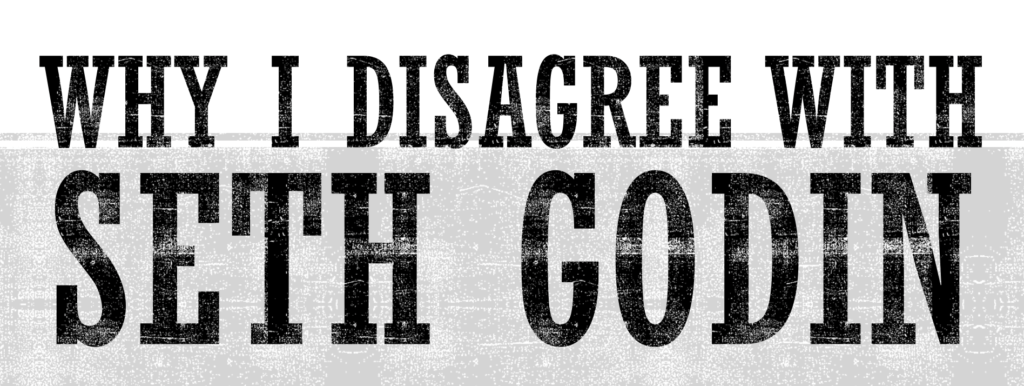
Seth Godin is a godlike figure in the marketing pantheon, and deservedly so. After you read the headline for this post you may be ready to get out the torches and pitchforks to hunt me down … so first, allow me to set the record straight.
I love Seth’s books and I’m a longtime fan. I reference him often in my own work. There is no marketing author in history who thinks as deeply, or expresses himself as beautifully, as Seth. And 99 percent of the time, we are closely aligned in our thinking.
Except this time. I disagree with Seth Godin, and not by a little.
Seth Godin and the purpose of marketing
 In Seth’s new collection of musings, This Is Marketing
In Seth’s new collection of musings, This Is Marketing, he emphasizes that marketing is about changing things: “Marketers make change. We change people from one emotional state to another,” he writes.
Any time change is needed, that is marketing, he said. If we need to change somebody’s opinion, their purchasing habits, their vote … that’s marketing. “Marketing means you need to change someone, or perhaps a group of some ones.”
But as I read Seth’s book, his repeated emphasis on changing people seemed … out of step with the world somehow.
In my mind, I envisioned this conversation at a dinner party as strangers introduce themselves:
“Hi, I’m Samantha. I’m a doctor who specializes in childhood diseases.”
“Nice to meet you. My name is Kurt and I own the pizza shop down the street.”
“My name is Seth Godin and I’m a professional marketer. That means I’m trying to change you. I might want to change your buying habits, political views, or even where you take a vacation. I may aim to change your emotional state and how you move through the world.”
I’m not sure I want to sign up for that kind of marketing career. It seems a little creepy. Moreover, I believe it’s an outdated view of what it means to be in marketing today.
Don’t tread on me
Seth Godin and I are the same age. We’ve had similar careers in many ways and we’ve both witnessed the last gasps of the “Mad Men” era in our early corporate days.
In the 1980s when we began our careers, Seth would have been absolutely correct in his summary of marketing — it was about changing people because marketing (primarily through advertising) was the only way to reach our customers. The pre-internet era was a one-way model — the flow of information was almost entirely from your company down to an audience.
A brand was what we told you. And we wanted you to tip our way. We wanted to change you.
Today, the model is radically different. People don’t need our marketing and advertising to make an informed decision or change their minds. They possess the accumulated knowledge of the human race in the palm of their hands. Our customers are completely capable of making up their own minds. Shouldn’t we respect that?
The information flow of influence these days is almost never from a company down to a consumer. It’s a tangled web of interconnections that result in unique customer journeys and decision paths.
In this age, a brand is what people tell each other. If an opinion is going to change, it is most likely going to come from a trusted friend, not from a company marketing initiative.
In fact, independent and knowledgable consumers will rebel if they think you’re trying to change them.
Another way forward
Today, the best marketing is not about changing our customers. It’s about coming alongside them.
Instead of assuming that a customer is somebody who needs to be changed — or is even open to being changed — let’s insert our own feelings into the mix. Do you want some multinational company or Madison Avenue agency to interrupt your day to change your mind or emotional state? Of course not. So let’s stop doing that. Let’s stop even thinking like that.
Instead, why not respect our customers as intelligent people who can make up their own minds on how to vote, where to shop, and what is worthy of their allegiance?
People are using the infinite information and insight in the palm of their hand to make well-informed decisions and then congregate into like-minded islands to spread the word among themselves. You might even call them tribes. : )
Seth Godin is correct that a lot of marketing is still about changing minds. But I believe our profession is moving toward respecting these like-minded tribes by being useful and supportive of their fully-formed individual needs and desires. It’s about earning a place in their pre-existing, organic conversations.
Come alongside consumers
Here are examples of companies who come alongside consumers.
Glossier has built a community of empowered users. It rejects what CEO Emily Weiss calls the “You don’t know what you want, let us tell you what you want” mentality, and along with its blog, reinforces the idea that we’re all experts who benefit from the shared relationship of a community of experts.
American Eagle (AE) stores sell jeans to teenagers with liberal views of the world. A major part of the company’s marketing effort is tapping into these strong views of their consumers. AE is open and aggressive on their views on LBGTQ rights and gun control, for example.
AE is not saying “we want to change your mind on gun control.” They’re saying “we respect your views and we want to come alongside you. We share your worldview and we’ll show you that we’re relevant in your world.”
Research shows that coming alongside consumers through shared meaning — instead of trying to change views — is one of the few options left to truly earn loyalty in this upside-down consumer world.
If we want consumers to be loyal to us, we must first show that we are loyal to them.
There are no absolutes
One of the things I emphasize in my book Marketing Rebellion: The Most Human Company Wins and my talks is that there are no absolutes in marketing. The answer to every marketing question is, “it depends!”
Likewise, the view of marketing I’ve presented today is not an absolute. There is still lots of room for Seth’s view that marketing is about changing people, there is still a business case for advertising, there is still a place for PR spin (as we see on the TV news every day!).
However, the trajectory of marketing is moving away from Seth Godin’s view of the world. Modern marketing needs to respectfully meet the needs of customers on their terms instead of aiming to manipulate buyer behavior, opinions, and emotional states as we did in the old days.
The notion that marketing is about “changing people” seems anachronistic in a world of the hyper-empowered, hyper-connected consumer who is solidly in control of their own customer journey.
Seth’s new book is called This is Marketing and I highly recommend it. He always gives you a lot to think about … and occasionally disagree with.
 Mark Schaefer is the chief blogger for this site, executive director of Schaefer Marketing Solutions, and the author of several best-selling digital marketing books. He is an acclaimed keynote speaker, college educator, and business consultant. The Marketing Companion podcast is among the top business podcasts in the world. Contact Mark to have him speak to your company event or conference soon.
Mark Schaefer is the chief blogger for this site, executive director of Schaefer Marketing Solutions, and the author of several best-selling digital marketing books. He is an acclaimed keynote speaker, college educator, and business consultant. The Marketing Companion podcast is among the top business podcasts in the world. Contact Mark to have him speak to your company event or conference soon.
Disclosure: Seth Godin book link is affiliate link.


